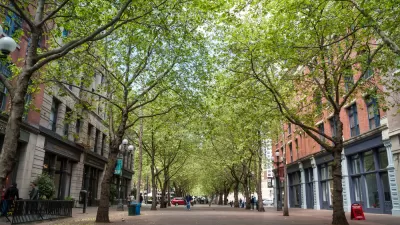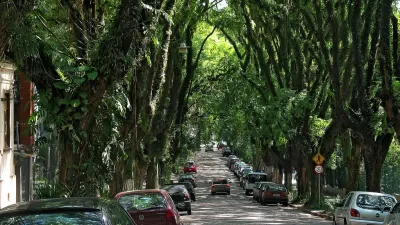The definition of blight may be in the eye of the beholder, but it may also be subconscious. Broken windows, abandoned buildings, and weed-filled yards may actually create stress and degrade health, according to a small study out of Philadelphia.

Designations of blight have a fraught legal history in the United States, with many so-called blighted neighborhoods being wiped out by urban renewal projects in the 1950s through 1970s. Regardless of what the law says, the subconscious mind may in fact know blight when it sees it.
A recent study by Gina South, a professor at the University of Pennsylvania Medical School, looked at Philadelphia residents' responses to blight-reduction efforts. The results of her small sample suggest that residents' heart rates and stress levels dropped when they observed lots that had been de-blighted through repairs, cleanups, and various greening techniques.
"There is increasing evidence to show that our environments do affect our health," South told Fast.co.Exist. "Urban planners really need to consider that as we intervene in places. Cities like Baltimore, Detroit, Cleveland, Philadelphia all have high rates of vacant land and that really impacts the health of people living in those neighborhoods."
"If that turns out the way we think it will, vacant lot greening really will be [proven to be a] low cost intervention cities can take to impact health and safety for a lot of residents," she said.
FULL STORY: Urban Blight Isn't Just Bad To Look At, It's Bad For Your Health

Trump Administration Could Effectively End Housing Voucher Program
Federal officials are eyeing major cuts to the Section 8 program that helps millions of low-income households pay rent.

Planetizen Federal Action Tracker
A weekly monitor of how Trump’s orders and actions are impacting planners and planning in America.

Ken Jennings Launches Transit Web Series
The Jeopardy champ wants you to ride public transit.

Driving Equity and Clean Air: California Invests in Greener School Transportation
California has awarded $500 million to fund 1,000 zero-emission school buses and chargers for educational agencies as part of its effort to reduce pollution, improve student health, and accelerate the transition to clean transportation.

Congress Moves to End Reconnecting Communities and Related Grants
The House Transportation and Infrastructure Committee moved to rescind funding for the Neighborhood Equity and Access program, which funds highway removals, freeway caps, transit projects, pedestrian infrastructure, and more.

From Throughway to Public Space: Taking Back the American Street
How the Covid-19 pandemic taught us new ways to reclaim city streets from cars.
Urban Design for Planners 1: Software Tools
This six-course series explores essential urban design concepts using open source software and equips planners with the tools they need to participate fully in the urban design process.
Planning for Universal Design
Learn the tools for implementing Universal Design in planning regulations.
Heyer Gruel & Associates PA
Ada County Highway District
Institute for Housing and Urban Development Studies (IHS)
City of Grandview
Harvard GSD Executive Education
Toledo-Lucas County Plan Commissions
Salt Lake City
NYU Wagner Graduate School of Public Service





























